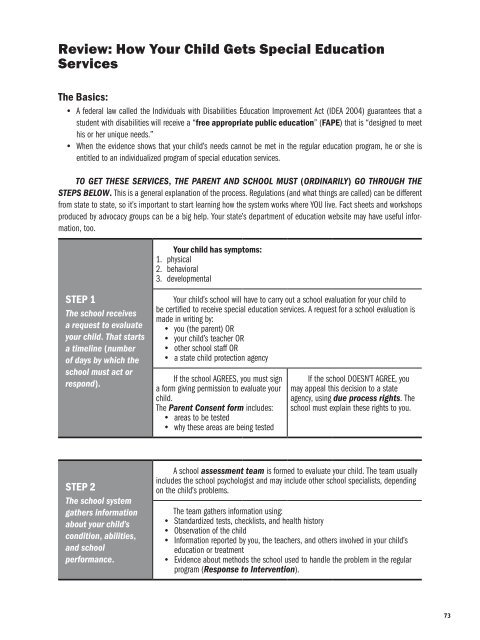Family Road Map Guide
You also want an ePaper? Increase the reach of your titles
YUMPU automatically turns print PDFs into web optimized ePapers that Google loves.
Review: How Your Child Gets Special Education<br />
Services<br />
The Basics:<br />
• A federal law called the Individuals with Disabilities Education Improvement Act (IDEA 2004) guarantees that a<br />
student with disabilities will receive a “free appropriate public education” (FAPE) that is “designed to meet<br />
his or her unique needs.”<br />
• When the evidence shows that your child’s needs cannot be met in the regular education program, he or she is<br />
entitled to an individualized program of special education services.<br />
TO GET THESE SERVICES, THE PARENT AND SCHOOL MUST (ORDINARILY) GO THROUGH THE<br />
STEPS BELOW. This is a general explanation of the process. Regulations (and what things are called) can be different<br />
from state to state, so it’s important to start learning how the system works where YOU live. Fact sheets and workshops<br />
produced by advocacy groups can be a big help. Your state’s department of education website may have useful information,<br />
too.<br />
Your child has symptoms:<br />
1. physical<br />
2. behavioral<br />
3. developmental<br />
STEP 1<br />
The school receives<br />
a request to evaluate<br />
your child. That starts<br />
a timeline (number<br />
of days by which the<br />
school must act or<br />
respond).<br />
Your child’s school will have to carry out a school evaluation for your child to<br />
be certified to receive special education services. A request for a school evaluation is<br />
made in writing by:<br />
• you (the parent) OR<br />
• your child’s teacher OR<br />
• other school staff OR<br />
• a state child protection agency<br />
If the school AGREES, you must sign<br />
a form giving permission to evaluate your<br />
child.<br />
The Parent Consent form includes:<br />
• areas to be tested<br />
• why these areas are being tested<br />
If the school DOESN’T AGREE, you<br />
may appeal this decision to a state<br />
agency, using due process rights. The<br />
school must explain these rights to you.<br />
STEP 2<br />
The school system<br />
gathers information<br />
about your child’s<br />
condition, abilities,<br />
and school<br />
performance.<br />
A school assessment team is formed to evaluate your child. The team usually<br />
includes the school psychologist and may include other school specialists, depending<br />
on the child’s problems.<br />
The team gathers information using:<br />
• Standardized tests, checklists, and health history<br />
• Observation of the child<br />
• Information reported by you, the teachers, and others involved in your child’s<br />
education or treatment<br />
• Evidence about methods the school used to handle the problem in the regular<br />
program (Response to Intervention).<br />
73














